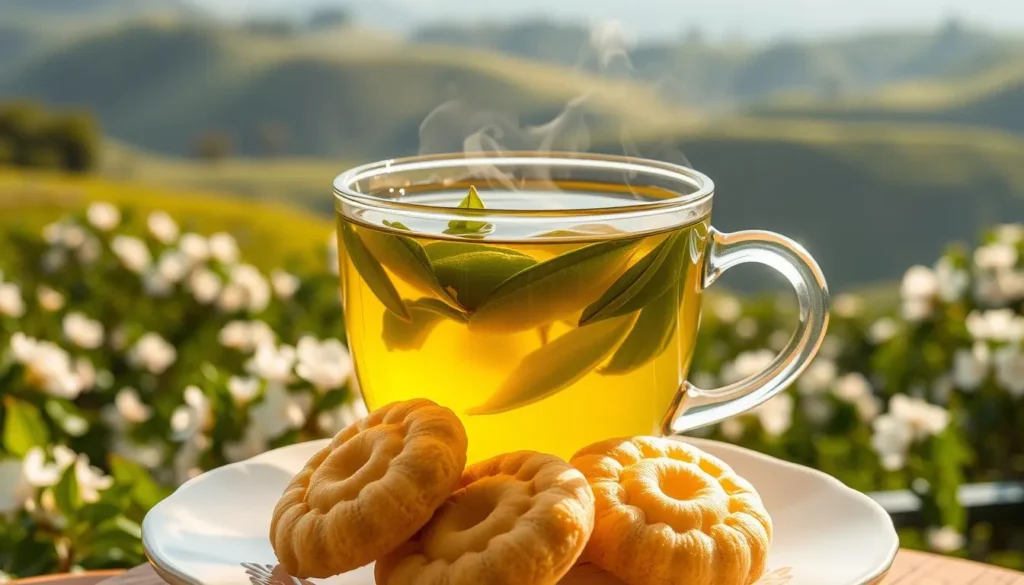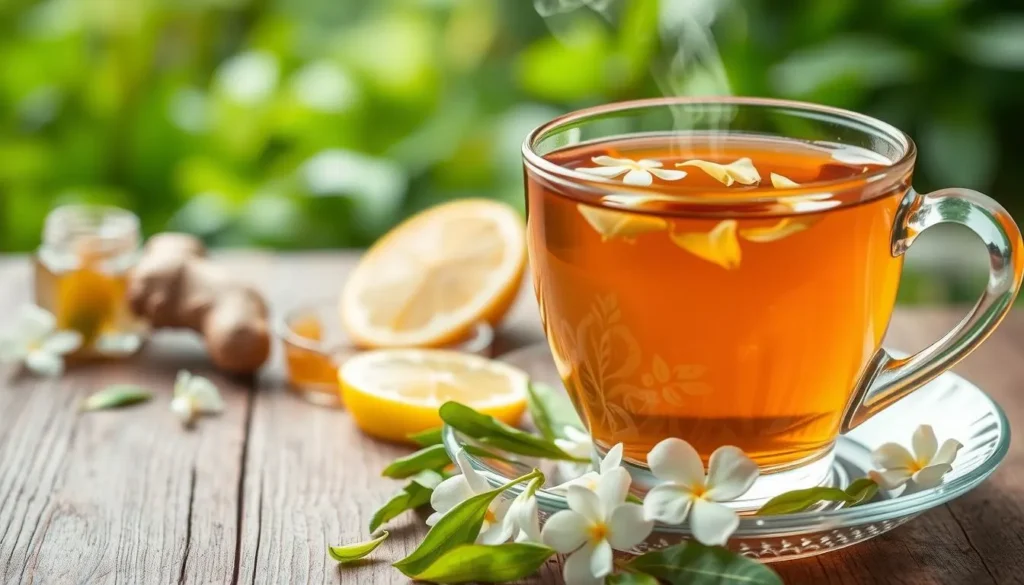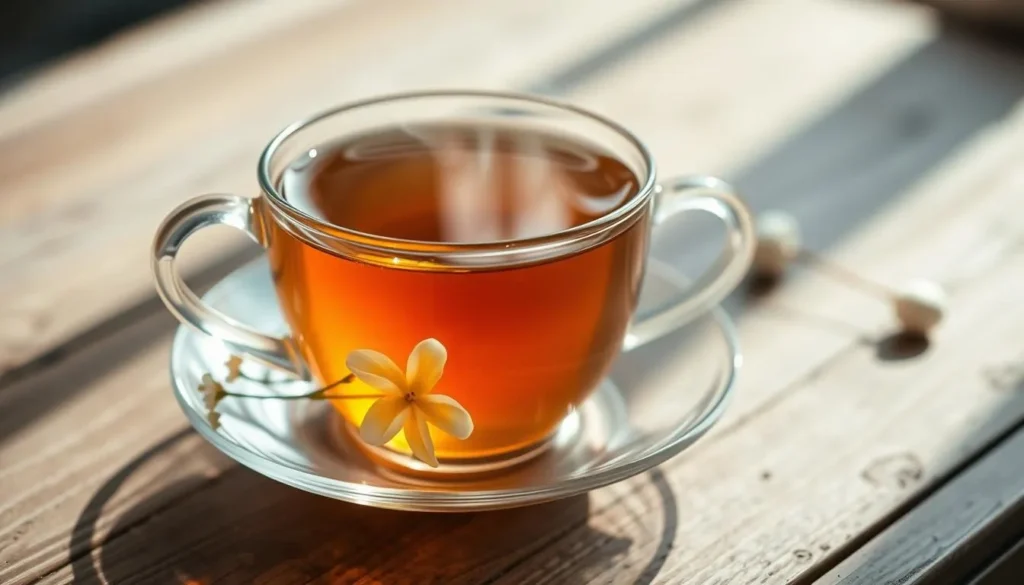When you enter the world of jasmine tea, you’re greeted by a calming and fragrant experience. This tea is a beloved tradition in many cultures, especially in Asia. It’s known for its light taste and health benefits.
Maybe you’ve enjoyed loose leaf jasmine tea on a quiet afternoon. Or maybe you’re just starting to explore its charm. Either way, organic jasmine tea stands out for its special qualities. Its soft floral scent and cool taste make it a hit with tea lovers.
Key Highlights
- Discover the origins and cultural significance of this tea.
- Learn what makes this tea so special.
- Explore the benefits of choosing organic varieties.
- Understand the differences between loose-leaf and other forms.
- Find out why jasmine green tea is a popular variation.
The Enchanting World of Jasmine Tea
Stepping into the world of this tea is a unique experience. This delicate tea has been a key part of Chinese culture for centuries. It started in the Qing Dynasty. It is more than a drink; it’s a sign of love, respect, and welcome.
Origins and Cultural Significance
It has a long history across cultures. In China, it’s a traditional tea for special events like weddings and business meetings. It’s also valued for its health benefits and used in traditional Chinese medicine.
The importance of this antioxident tea is seen in Chinese literature and art.
| Cultural Significance | Traditional Use | Medicinal Properties |
| Symbol of love and respect | Weddings and business meetings | Used in traditional Chinese medicine |
The Scenting Process: How It is Made
The scenting process is unique. Jasmine flowers are layered with tea leaves, allowing the tea to soak up the scent. This process is done many times to get the perfect mix. The result is a tea that’s both light and fragrant, with a taste that’s improved by the jasmine.
The art of making jas.mine tea shows the patience and skill of tea makers. With its rich history, cultural importance, and special making process, it fascinates tea lovers worldwide.
Exploring Different Types of Jasmine Tea
As you explore , you’ll find many types. Each has its own taste and smell. They vary by tea leaves, scenting method, and craftsmanship.
Jasmine Green Tea: The Classic Choice
Jasmine green tea is the most loved. It mixes green tea’s taste with jasmine’s scent. It’s refreshing and good for your health.
Jasmine Pearl Tea: Handcrafted Elegance
Jasmine pearl tea, or jasmine silver needle, is made by hand. Tea leaves are rolled into small pearls. This makes the tea look special and taste better.
Jasmine White Tea: Delicate and Refined
Jasmine white tea is scented with jasmine flowers. It’s light and has a soft smell. It’s great for those who like a milder taste.
Jasmine Oolong Tea: Complex Flavor Profile
Jasmine oolong tea is a mix of oolong tea and jasmine scent. It has a rich taste. Tea lovers enjoy its unique flavor.
Try different flavours of this teas to find your favorite. Whether you like the classic jasmine green or the complex jasmine oolong, there’s something for everyone.
- Jasmine Green Tea: Refreshing and classic
- Jasmine Pearl Tea: Handcrafted with unique appearance
- Jasmine White Tea: Delicate and refined
- Jasmine Oolong Tea: Complex flavor profile
Health Benefits of Jasmine Tea
This is more than just a lovely scent. It’s packed with health benefits that can improve your daily life. Drinking this tea can boost your well-being and offer specific advantages like antioxidants and stress relief. Try it out and see the difference for yourself.
Powerful Antioxidant Properties
It is full of antioxidants. These antioxidant properties protect your body from harmful free radicals. Drinking jasmine beverage regularly can help fight oxidative stress and reduce the risk of chronic diseases.
Stress Reduction and Mental Clarity
Enjoying tea can be a calming experience. Its soothing aroma and flavor help calm your mind. This can improve your mental clarity and focus, leading to a more balanced state of mind.
Digestive Health Support
this drink is good for your digestive health. It may reduce inflammation and improve gut health. Its natural properties can soothe digestive issues, making it a comforting choice for those with digestive problems.
Weight Management Benefits
Adding this tea to your diet can help with weight management. It can boost your metabolism, helping your body burn fat more efficiently. This can support your weight loss goals when combined with a healthy diet and exercise.
Skin Health and Anti-Aging Effects
The antioxidants in this drink are also good for your skin health and anti-aging. They protect your skin from oxidative damage. This can help keep your skin looking young and reduce signs of aging.
Caffeine Content in Jasmine Tea
I’s caffeine content can change your day’s energy and calm. This fragrant tea has caffeine, but the amount depends on the tea leaves and brewing method.
Comparing Caffeine Levels in Different Jasmine Tea Types
This tea comes in green, white, and oolong types, each with different caffeine levels. Jasmine green tea has the most, about 25-30 milligrams per 8 oz cup. This Jasmine white tea has less, around 6-8 milligrams per 8 oz cup. Jasmine oolong tea is in between.
Jasmine Tea for Morning Energy vs. Evening Relaxation
Looking for a morning boost or an evening calm? Knowing the caffeine content in tea helps. For a morning pick-me-up, choose jasmine green tea. For evening calm, jasmine white tea or decaf is better.
When picking this drink, think about your caffeine sensitivity and daily routine. This way, you can enjoy it at the best time for you.
How to Brew the Perfect Cup of Jasmine Tea
Whether you’re a seasoned tea lover or new to it, learning to brew It can make your experience better. The art of brewing jasmine tea involves several key factors. These factors work together to bring out the tea’s delicate floral notes and complex flavor.
Selecting Quality Water and Ideal Temperature
The quality of the water you use can greatly affect the taste of your drink. Use fresh, filtered water to avoid any off-flavors or odors. The ideal temperature for brewing this drink is between 160°F and 170°F. This temperature range helps to preserve the tea’s delicate aroma and prevents bitterness.
Proper Tea-to-Water Ratios
Getting the tea-to-water ratio right is crucial for achieving the perfect balance of flavors. A general guideline is to use 1 teaspoon of loose-leaf jasmine per 8 oz of water. Adjust this ratio according to your personal preference for stronger or milder.
Steeping Times for Different Varieties
The steeping time can vary depending on the type of tea you’re brewing. For jasmine green tea, a steeping time of 2-3 minutes is recommended. For more delicate varieties like jasmine white tea, a shorter steeping time of 1-2 minutes is preferable.
Multiple Infusion Techniques
One of the joys of this tea is that you can infuse it multiple times.. To do this, simply steep the tea leaves for the recommended time, then re-steep them in subsequent infusions, gradually increasing the steeping time as needed.
Troubleshooting Common Brewing Problems
If your tea tastes bitter, it might be due to using water that’s too hot or steeping the drink for too long. Conversely, if the taste is too weak, you might need to adjust your jasmine leaves-to-water ratio or steeping time. Experimenting with these variables will help you find your perfect cup.
| Jasmine Tea Type | Ideal Steeping Time | Recommended Temperature |
| Jasmine Green Tea | 2-3 minutes | 160°F – 170°F |
| Jasmine White Tea | 1-2 minutes | 150°F – 160°F |
| Jasmine Oolong Tea | 3-5 minutes | 180°F – 200°F |
Delicious Jasmine Tea Recipes and Variations
It is more than just a drink. It’s a versatile ingredient for many tasty recipes. You can make unique drinks, desserts, and even savory dishes with it.
Creamy Jasmine Milk Tea
To make creamy jasmine milk tea, mix jasmine green tea with milk, sugar, and vanilla. Here’s a simple recipe:
- Steep jasmine green tea in hot water
- Mix with milk and sugar to taste
- Add a dash of vanilla extract for extra flavor
Refreshing Jasmine Iced Tea
For a cool summer drink, brew strong antioxident drink and serve it over ice. Add lemon or lime slices for extra taste.
Conclusion
It is a soothing and aromatic delight. It not only pleases your taste buds but also offers health benefits. You can find different types like jasmine green, pearl, and white tea, each with unique flavors and aromas.
There are many ways to enjoy it, from traditional brewing to creative recipes. You can make jasmine milk tea or iced. Drinking this can boost your health, thanks to its antioxidants, stress relief, and digestive benefits.
Is this drink good for you?
Yes, it is, thanks to its rich nutrients and versatility. Adding this to your daily routine can bring many health benefits. It’s a favorite among tea lovers for good reason.



